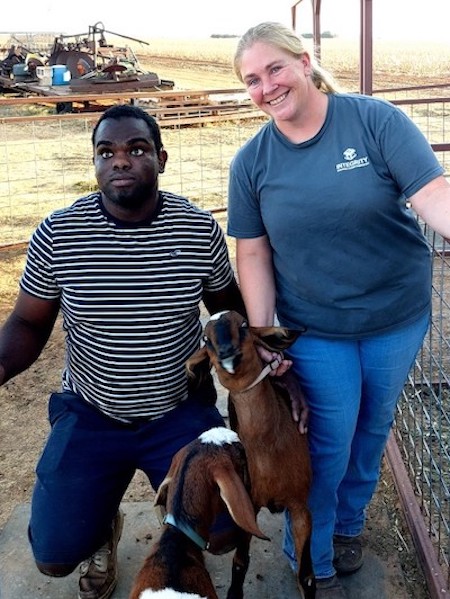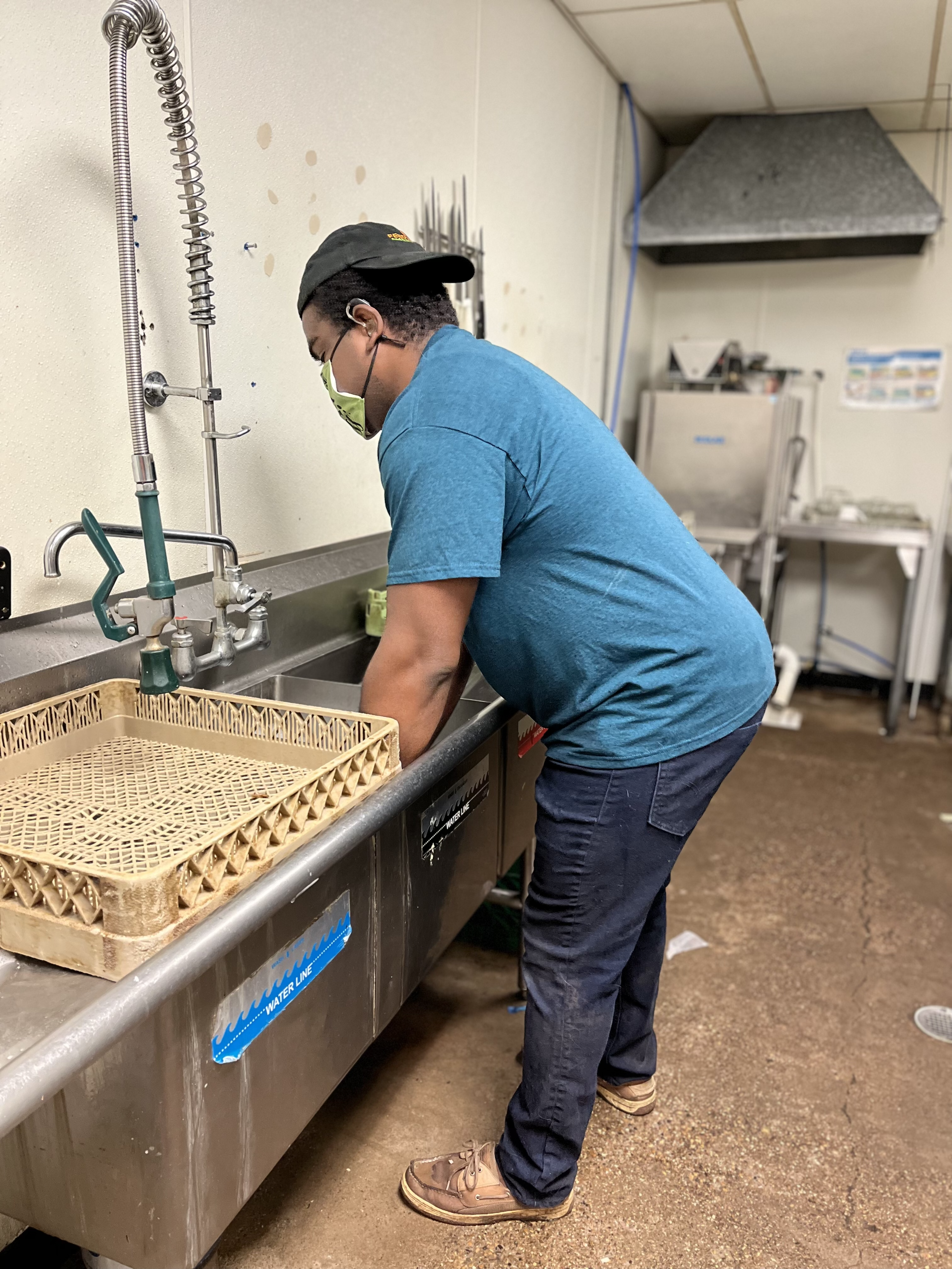The Hardest Job of All: Acknowledging the Costs of Showing Up
By George Stern
August 2022
Since this is an article about employment, I’ll save you the suspense and say from the start that I am employed. This makes me extremely fortunate. Too many disabled people—too many deafblind people—cannot say the same. I am a dishwasher at a local gastropub four days a week, five to twelve hours a day. Velveeta-crusted serving bowls and burned bottom pots notwithstanding, I love my job: the physicality of it that keeps my muscles active and blood sugar low; the practical strategizing my brain must do to keep the dishline moving efficiently; the fact that the kitchen is usually full of unrestrained laughter and companionable chatter. It also helps that, with the opportunity to work double shifts, the dancing dollar signs are inching ever higher each pay period. This is the closest I’ve been to being financially independent since my early college years when I was pulling down thousands in scholarships every semester and packing a gold trimmed credit card.
Most of all, I love my job for what it represents: the first concrete step toward my dream of being the owner-chef of a restaurant. How did this happen? Through what wondrous alchemy of robust vocational rehabilitation services, deafblind skills training, and self-advocacy did this miracle of gainful employment manifest? It came about due to my spending way too much time on Facebook and sending a very blunt email.

Facing Up to the Real Job Search Challenges
I’d seen a post in a Facebook foodies group asking about restaurants willing to hire culinary students who needed kitchen experience. As it turned out, every restaurant was hiring, or wanting to, and having a tough time of it (low wages, long hours, the pandemic, and the draw of much better options were (still are) driving workers away). A restaurant that already commanded many of my Uber Eats dollars was among those that expressed an interest in hiring. Figuring that desperation breeds opportunities, I emailed them.
That first email (this was not the blunt one and did not disclose my disabilities) got me an invitation to come in and fill out an application. (As an aside, do you realize how inherently disadvantaging on-site applications are for disabled people?) That’s when I sent the blunt one:
Thank you for the prompt reply. In the interest of full disclosure and saving both your HR team and me valuable time, I’d like to disclose that I am blind with a hearing impairment. I’ve had enough industry people make assumptions about what I can and can’t do based on this dual disability, so please be completely honest in answering this question: Would your restaurant even consider hiring a disabled worker, especially a deafblind one? If not, that’s unfortunate but as will be. If y’all are at least willing to give a disabled applicant equal consideration to a nondisabled one, then I look forward to coming in and convincing you that I can be a credit to your establishment. Thank you.
I was asking, in effect, whether it was even worth my time to show up. By this point in my life, I’d had enough of expending my energy, social capital, and scarce financial resources to show up and stand out for some opportunity, only to discover that I hadn’t had a fighting chance. This fed up—some might say defeatist—attitude is not the empowering, liberating, take-charge-of-your-destiny message popularized in blindness, deafblindness, independence training, and career training circles. This message tells us that it’s only by showing up, no matter what, with confidence, competence, focus, and a can-do-will-do attitude that we can make forward progress.
I was reminded how pervasive this attitude is when I read a deafblind friend’s ruminations on Facebook about her inability to find a job. She wrote that it must be some personal flaw of hers that was standing in the way of successful employment. Maybe she’d picked the wrong major in college or switched majors too often; maybe she hadn’t taken advantage of the right opportunities in her stint at a training center.
She wrote about several deafblind role models who were successfully employed. But I have enough of a friendship with some of these people to know that their paths have been anything but certain. Although many earned challenging degrees and accumulated a multitude of certifications, their next steps have been uncertain. Cost of living, it turns out, doesn’t give a pink potato what school we conquered or how inspiring others think we are, just whether we can pay up when the rent, the water, the gas, the health insurance, and other bills come due. The daily grind isn’t swayed by how masterfully workshopped and templated our résumés are (my boss hasn’t even seen mine!), or how many bullet points are in the skills and accomplishments sections; all that matters is whether we have the systems in place to keep us rolling out of bed and taking one step after another.
Building Skills and Strong Work Ethic
My systems include a network of mentors and friends who hold me accountable and provide a range of perspectives on seemingly insurmountable issues; a work ethic instilled in me by my parents’ example and reinforced by full and early inclusion in household tasks; two dogs whose ebullient tail-wagging happiness depends on me honoring my commitments to walk, play, feed, and train them; and a work team who depend on—and acknowledge—my diligence on the dish line. You’ll notice the absences in my list of systems: no mention of training centers or vocational rehabilitation services. I’ll be the first to admit that training centers can be incredible settings for skills building, finding community in disability, and acquiring confidence one crushed goal at a time.
No number of gilded diplomas or freedom bells, no amount of follow-up by representatives can alter the cold hard fact that too many of our home environments aren’t designed to reward the new habits and independent selves we spend months building, and humans simply do not – cannot – sustain unrewarded behaviors. Vocational rehabilitation services can be helpful, particularly when well-funded, organized sensibly, and staffed by imaginative disability-informed caseworkers. Yes, what many of us find instead is an inflexible focus on goals and case closure numbers, a distinct lack of imagination and problem-solving, and a disturbing amount of ignorance regarding on-the-ground conditions for disabled people.

The Real Costs of Showing Up
But the greatest failure of these institutions lies in their inability to acknowledge the costs to us of showing up. What do we do when showing up on time for our jobs takes three quarters of our paycheck in Uber fares and even the O&M instructor agrees that the combination bus/walking route is inefficient and unsafe? What do we do when months of wrestling with inaccessible online applications and putting our best feet forward are rewarded by bland “you’re not a good fit” responses or no response at all, likely because we dared to disclose our disabilities? In short, what do we do when just showing up against all the odds, through obstacles and pain others can barely imagine, still isn’t enough?
The answers to this are complex, situational, and individual, a reality that I suspect our one-size-must-fit-all models of independence/career training aren’t ready to face. It’s telling how many of the most happily and gainfully employed disabled people I know, blind, deafblind, or otherwise, are those who chart their own paths to employment, whether that involved starting their own businesses, creating and monetizing a personal brand, striking out into unexpected industries, or creating rewarding roles for themselves within their communities. They—we—are authors, motivational speakers, life coaches, artists, inventors, sex educators, tech gurus, café owners, accessibility experts, and owner-chefs in the making, to list a few, and we’re rewriting the rules of showing up: when we do it, how we do it, what we will and won’t show up for, and most of all, what costs we are or aren’t willing to bear. This is true independence, real empowerment, and it’d be nice if disability policy at every level caught up to us where we are.
An Afterword
Where I am, several months after the earliest draft of this article, is unemployed, again. The gastropub (my gastropub, as I’d begun to think of it) ended up folding during what was supposed to be a transition to a better location.
Ironically enough, I got the news a few weeks after vocational rehabilitation had closed my case as “successfully completed.” What do you do when showing up and working hard isn’t enough? If you’re me, you write an article with a less-than-happy ending to try and help parents, service providers, and my fellow deafblind appreciate the messy, unpredictable reality of life as it happens. And then, you try again. To butcher the rapper Bad Baby’s iconic phrase, “Catch me on LinkedIn.”